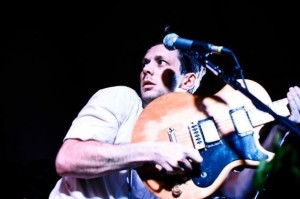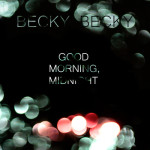
More than a decade since the release of ‘The Decline of British Sea Power’, the good ship BSP is on course to claim the title of Britain’s most sublimely deranged creative collective. Their artistic capital includes not just an extensive back catalogue covering a multitude of musical escapades. It’s not even about the now legendary stage antics and unforgettable life performances in locations that included UK’s highest pub, libraries, museums, sea forts, an embassy and a church in the Arctic circle.
Their shows and their music is an altogether different proposition from your standard gig fare: at the very least it’s a defiant crusade against boredom, and at its best it’s a transcendental experience defying the limitations of explanations and neat labels. Add to this their very distinct iconography and mythology, and you start to understand BSP’s strong gravitational pull. What this band does can only be described in more elusive, almost ephemeral terms like ‘inspiration’, ‘creative force’ or even a certain attitude towards the world.
Unlike many bands of their generation, British Sea Power have grown exploring diverse musical landscapes and artistic forms. The result is that they have gained credibility and, frankly, have got better with age, which is a hugely defiant achievement in the industry that worships physical youth.
But the most important thing is that the best band in Britain is back on the road, playing summer festivals across the land and touring their new project ‘Sea of brass‘ in the autumn. I wanted to get a teeny blood-shot glimpse into the minds and plans of this magnificent sound unit and sent a batsignal to the band. My call was answered courtesy of the frontman Yan.
E voila, ladies and gents, take it away….Mr Yan Scott Wilkinson talking about festivals, giant trumpets and OAPs’ rights to bear arms.
AC: You are playing a relatively small number of festivals this year. How do you choose where you play?
YW: Mostly it’s a fairly practical thing. We need to eat and we need to survive. Playing live is a major part of the band and festivals are a big thing too. Sometimes we make exceptions and play somewhere because its artistic or an interesting place to travel to or beautiful, and other times because they offer a load of cash.
AC: Your first festival of the season, Lunar Festival, has a more experimental and theatrical line up but also with a strong folk leaning. Last year you played Moseley Folk festival. To what extend to you identity your music with this genre?
YW: We were never particularly obsessed with any particular niche of music. We accidentally went slightly towards indie/alternative as there was more common ground between us, but as time has passed we aren’t really bothered with these descriptions so much anymore. Folk can mean two things to me: either a description of instrumentation and mood (i.e. acoustic, intimate, personal and possibly old worldy), or just music which tells stories from real life. I prefer the latter. In this respect we are a little folky. Occasionally we also utilise an acoustic guitar if no one objects. On this occasion we will definitely be fully amplified.
AC: You’ve always been the band that did their own thing, not concerned with any current trends and musical fashions. You’ve pretty much pioneered (or at least brought into prominence) gigs in unusual spaces. You started unusual collaborations, performed live soundtracks live, explored a huge range of styles… At times it feels the world is slowly catching up with you. Don’t you feel just a tad under appreciated, at least in commercial terms?
YW: We’ve often followed our interests rather than our wallets. Occasionally I do regret this but not very often. Maybe when the Ferrari needs re shoing or when I have an idea that is difficult to realise without a vast wad of cash. Recently I’ve been dreaming of my long held aim of creating a long term garden. More than a garden really. More towards Ian Hamilton Finlay, and also a space to experiment with in and outdoor sound art. Hopefully something will come along. Money isn’t everything, except when you have none at all.
AC: Do you think that art should be challenging? Do you approach your own projects as challenges?
YW: I think life would be boring without challenges myself. Art can be challenging and often the good sort is but sometimes it just makes you feel nice inside.
AC: ‘Sea of brass’ is your latest project. How did this idea come about? What should we expect?
YW: I was napping on a plane from Scotland and heard a giant trumpet. Always one to put two and two together, I applied this image to the problem of what to do at a chocolate factory on Derby. That sounds daft. It is, in fact, accurate. It became a collaboration with brass arranger Peter Wraight who is organising the brass end. I’m both excited and nervous about what will happen. We will be premiering at Durham brass festival with 24 or more brass musicians of the highest calibre. There is also the chance of a visual spectacle of some sort occurring.
AC: You’ve now done 3 soundtracks, is this now the future of British Sea Power?
YW: It is something we have become more and more interested in. it is definitely a part of our future. I would particularly like to find projects which are the opposite of what we are known for. Something aside from the sea basically. I would love to be a part of a very modern film project. We had a little taste of it when we did a temporary soundtrack for ‘Out of the present’, a film about the international space station. This was very interesting and brought me into whole new areas and ways of working. I have since become as fascinated by digital music as I always was by the older ways of doing things.
AC: Have you ever been temped to produce your own film, or perhaps write your own script?
YW: Occasionally, yes. I have two ideas at the moment but they are not in any serious development. There is a poet called Jock Scott who we have worked with and who deserves much more regard. I would love to help make a good film about him. I also have the basics of a fictional story that will most likely never see light of day. Mostly I am particularly interested in developing some installation ideas in physical spaces that involve sound and visual elements.
AC: Are we likely to see any more club nights from British Sea Power?
YW: We are looking at attempting to take our Krankenhaus club on holiday to Manchester. It will be called Mankenhaus.
AC: You quite recently worked on the Kurt Schwitters sound installation at the Tate Britain, is visual arts something that might inform the band’s future direction?
YW: It’s not something we’ve discussed as a collective. I find this sort of thing rather interesting though and have one particular idea that could possibly happen.
AC: You’ve always been a very literate cultured band drawing inspiration from a vast range of sources, any recent reading or viewing recommendations?
YW: Thanks. Very nice of you to say so. I liked Michel Houellebecq’s last book, as I did all his others. ‘Tell me no lies’, a collection of journalism put together by John Pilger was interesting and I enjoyed wandering around Yves Saint Laurent’s garden in Marrakech recently.
AC: This year celebrated 20th anniversary of Britpop. For some it was the golden age. For others it was definitely a deeply conservative and reactionary movement stuck in the 60s stereotypes of Britishness. Your concept of Britishness seems radically removed from any unsavoury connotations of nationality. Is it an important part of your identity? Does it have an effect on how you are perceived abroad?
YW: Unfortunately, we are neither a part of all that nostalgia stuff, and the name is possibly too ironic to translate and come across as being intelligent. We are probably seen as nationalistic when, in fact, we are quite the opposite. One makes one’s own rod, I suppose.
AC: In last year’s interview with New Statesman, you described your political spectrum as ‘somewhere between Monster Raving Loony Party and socialist’. Could you be persuaded to enter politics?
YW: I recently briefly considered running for Police commissioner in Brighton. I would have given OAPs some kind of power of arrest and possibly the right to bear arms for those over 70. Other than that, I don’t think I’d enjoy the world of politics. Too many knobs really.
AC: Is Zeus still in service?
YW: Very much so. Still under the control of Totally Tidy Tours and very much in amongst it on a daily basis. Our number one vehicle of travel.
Click here to get empowered by the ‘Sea of Brass’.
BSP’s next outing will be taking place in the wilds of Warwickshire on 6 June. For more information and tickets hop over to the Lunar Festival site.




